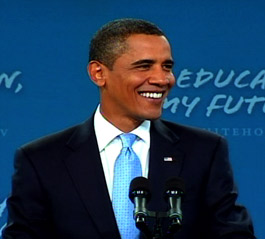 Can we now please have an end to the silliest non-controversy of the young Obama administration?
Can we now please have an end to the silliest non-controversy of the young Obama administration?
I caught the tail end of the President’s speech on CNN’s live stream, and I’ve read the prepared text. The kids just saw a highly accomplished black man, who lives with his wife and plays an active role in raising their delightful young children, tell students of all races that it’s important to stay in school and do their best.
Any excuse for staging such an event is a good enough excuse for me. Given that the black man in question is our President, it would be a huge opportunity lost for him not to provide a back-to-school message.
Here’s the beginning of the part I caught, from the prepared text:
Don’t be afraid to ask questions. Don’t be afraid to ask for help when you need it. I do that every day. Asking for help isn’t a sign of weakness, it’s a sign of strength. It shows you have the courage to admit when you don’t know something, and to learn something new. So find an adult you trust – a parent, grandparent or teacher; a coach or counselor – and ask them to help you stay on track to meet your goals.And even when you’re struggling, even when you’re discouraged, and you feel like other people have given up on you – don’t ever give up on yourself. Because when you give up on yourself, you give up on your country.The story of America isn’t about people who quit when things got tough. It’s about people who kept going, who tried harder, who loved their country too much to do anything less than their best.
Hear, hear. Fellow conservatives would be well-advised to save their criticism for more consequential debates.

